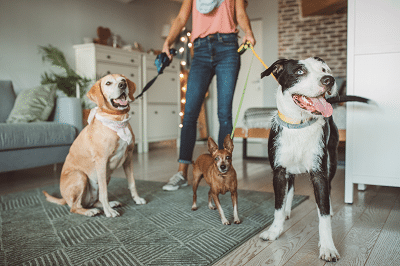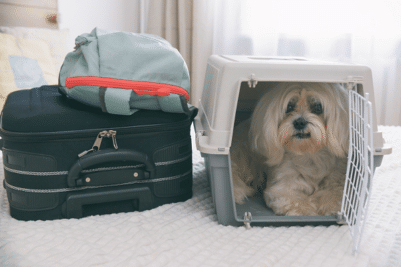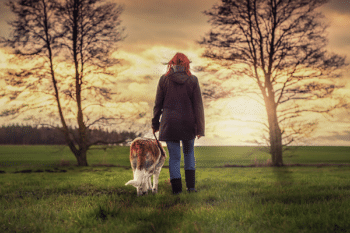Summer means swimming, camping, relaxation, and lots of fun in the sun!
But high temperatures can put your dog in danger of heat stroke.
Heat stroke, also known as heat exhaustion, hyperthermia, or heat prostration, is a serious concern for dogs.
When their body temperature rises from the normal 101°F – 102.5°F (38.3°C to 39.2°C) to about 104°F – 105°F (40°C – 40.6°C), they lose the ability to regulate their internal temperature, which can cause organ damage and even death.
Dogs have a difficult time cooling themselves:
- Dogs don’t sweat like we do. The main method for cooling in dogs is Dogs with short snouts, such as Bulldogs, Boxers, and Shih Tzus are even more susceptible to overheating because they can’t pant as well as dogs with longer snouts.
- Dogs wear fur coats. While their coats actually help to promote cooling by trapping a bit of cool air close to the skin, it only works for so long.
- Dogs can’t head to cooler locations. Unlike us, pets cannot head to the mall, library, or cooling center on their own – they rely on us to help keep them cool.
Preventing heat stroke is crucial to your dog’s health and the responsibility lies with us. Here are some things you can do to prevent heat stroke:
Keep your dog cool.
- If your dog is indoors for most of the day and you have air conditioning, that’s great! If you don’t have air conditioning, keep your windows and curtains closed during the day to keep the heat out, and keep some fans running to help cool him down. Open the windows at night to let the cooler air in.
- If your dog spends most of his time outdoors, make sure you provide plenty of shade and encourage him to rest in shady areas by putting his food and water bowls there. You can also use an outdoor fan but make sure you keep the cord out of his reach.
- Some dogs enjoy a plastic kiddie pool full of water placed in the shade. Be sure your dog can get in and out on his own and supervise his dips in the water.
- If you have a swimming pool, please remember that dogs can’t climb ladders. Train your dog to use the steps if your pool has them. Never leave your dog unattended in your pool – accidental drownings happen every year when dogs exhaust themselves trying to find a way out.
Provide water.
- You must provide a constant source of fresh water for your dog.
- Toss ice cubes into the bowl to keep the water cool.
Practice safe exercise.
- Restrict rigorous walks and playtime to short sessions in the early morning or late evening. If temperatures and humidity remain high in the overnight hours, skip long walks until the heat breaks.
- Be sure to frequently stop for water breaks on walks. Bring along a dog water bottle or collapsible water dish with lots of cold water. You could even bring along a misting bottle so you can spray him off every now and then.
- Try to keep to the shady side of the street and remember that your dog’s feet are just as sensitive to hot asphalt as your feet are.
- When you return home, you can hose your dog down if he likes that, but remember to run the water first, since any water sitting in the hose will be hot enough to burn your dog.
Leave your dog at home.
- Never ever, ever leave your dog in the car. Not on cooler days, not in the shade, and not with the windows open. If you are stopping, make sure it is at a location that allows you to bring your dog. If you can’t bring your dog, leave him at home.
Heat stroke is a very serious issue, and preventing it is far better than treating it. Enjoy the dog days of summer and take care to prevent heat stroke in your dog!
LifeLearn News
Note: This article, written by LifeLearn Animal Health (LifeLearn Inc.) is licensed to this practice for the personal use of our clients. Any copying, printing or further distribution is prohibited without the express written permission of Lifelearn. Please note that the news information presented here is NOT a substitute for a proper consultation and/or clinical examination of your pet by a veterinarian.










